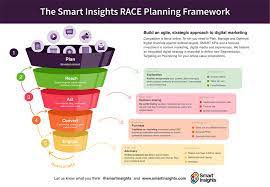The Importance of a Strong Digital Marketing Strategy
In today’s digital age, having a well-defined digital marketing strategy is crucial for the success of any business. With the increasing reliance on online platforms for information and shopping, businesses need to adapt and leverage digital marketing techniques to reach their target audience effectively.
Key Components of a Digital Marketing Strategy
A successful digital marketing strategy typically includes the following key components:
- Target Audience Identification: Understanding your target audience is essential for creating relevant and engaging content that resonates with them.
- Content Creation: Creating high-quality and valuable content is vital for attracting and retaining customers. Content can include blog posts, videos, infographics, and social media posts.
- Search Engine Optimization (SEO): Optimizing your website and content for search engines helps improve your visibility online and attract organic traffic.
- Social Media Marketing: Leveraging social media platforms to engage with your audience, promote your brand, and drive traffic to your website.
- Email Marketing: Sending targeted emails to subscribers can help nurture leads, build relationships with customers, and drive sales.
- Paid Advertising: Using paid advertising channels such as Google Ads or social media ads to reach a broader audience and increase brand awareness.
- Data Analysis: Monitoring and analysing key performance indicators (KPIs) to measure the effectiveness of your digital marketing efforts and make data-driven decisions.
The Benefits of a Strong Digital Marketing Strategy
A well-executed digital marketing strategy offers several benefits to businesses, including:
- Increased Brand Awareness: By reaching a wider audience online, businesses can increase their brand visibility and recognition.
- Better Customer Engagement: Engaging with customers through various digital channels helps build relationships and foster loyalty.
- Improved Conversion Rates: Targeted digital marketing campaigns can lead to higher conversion rates and ultimately drive sales.
- Data-Driven Decision Making: Analysing data allows businesses to understand customer behaviour better and optimise their marketing strategies accordingly.
- Cost-Effectiveness: Compared to traditional marketing methods, digital marketing is often more cost-effective and offers a higher return on investment (ROI).
In conclusion, developing a robust digital marketing strategy is essential for businesses looking to thrive in today’s competitive landscape. By incorporating key components such as targeting the right audience, creating valuable content, leveraging various online channels, and analysing data effectively, businesses can achieve their marketing goals and stay ahead of the curve in the digital realm.
Top 5 Advantages of a Digital Marketing Strategy
- Increased brand visibility and recognition
- Enhanced customer engagement and relationship building
- Improved targeting and reach of specific audience segments
- Cost-effective compared to traditional marketing methods
- Ability to track and measure performance for data-driven decision making
Challenges in Digital Marketing Strategy: Navigating High Competition, Constant Changes, and More
- High competition
- Constant changes
- Resource-intensive
- Data privacy concerns
- Negative feedback amplification
- Ad fatigue
Increased brand visibility and recognition
One of the key advantages of implementing a strong digital marketing strategy is the significant increase in brand visibility and recognition it offers. By leveraging various online channels such as social media, search engines, and email marketing, businesses can reach a wider audience and establish a strong presence in the digital realm. This heightened visibility not only helps attract new customers but also reinforces brand awareness among existing ones, ultimately leading to enhanced brand recognition and credibility in the competitive market landscape.
Enhanced customer engagement and relationship building
Enhanced customer engagement and relationship building are key benefits of a well-planned digital marketing strategy. By leveraging various online channels such as social media, email marketing, and interactive content, businesses can actively engage with their target audience, respond to inquiries promptly, and provide valuable information to build trust and loyalty. This continuous interaction fosters stronger relationships with customers, leading to increased brand advocacy, repeat business, and ultimately long-term success in the digital landscape.
Improved targeting and reach of specific audience segments
One significant advantage of a well-crafted digital marketing strategy is the enhanced targeting and reach of specific audience segments. By utilising tools such as demographic data, online behaviour tracking, and social media insights, businesses can precisely identify and engage with their target audience. This targeted approach ensures that marketing messages are delivered to the right people at the right time, increasing the likelihood of conversion and fostering stronger customer relationships. Additionally, digital marketing allows businesses to reach a global audience, breaking geographical barriers and expanding their market reach beyond traditional boundaries.
Cost-effective compared to traditional marketing methods
One significant advantage of implementing a digital marketing strategy is its cost-effectiveness when compared to traditional marketing methods. Digital marketing allows businesses to reach a wider audience at a fraction of the cost of traditional advertising channels such as print or TV ads. With targeted online campaigns, businesses can allocate their budget more efficiently and track the performance of their marketing efforts in real-time, ensuring a higher return on investment. This affordability aspect makes digital marketing an attractive option for businesses of all sizes looking to maximise their marketing impact while minimising costs.
Ability to track and measure performance for data-driven decision making
One significant advantage of implementing a digital marketing strategy is the ability to track and measure performance effectively, enabling data-driven decision making. By utilising analytics tools and monitoring key performance indicators, businesses can gain valuable insights into the effectiveness of their marketing efforts. This data-driven approach allows companies to identify what strategies are working well, what areas need improvement, and make informed decisions to optimise their campaigns for better results. Ultimately, the ability to track and measure performance in digital marketing empowers businesses to refine their strategies based on real-time data, leading to more targeted and successful marketing initiatives.
High competition
In the realm of digital marketing, one significant drawback is the prevalence of high competition. The digital marketing landscape is saturated with businesses vying for the attention of online consumers, making it increasingly challenging for companies to distinguish themselves and stand out from the crowd. This intense competition can result in businesses struggling to capture and retain the interest of their target audience amidst a sea of competing messages and advertisements, requiring them to devise innovative strategies to cut through the noise and make a lasting impact.
Constant changes
In the realm of digital marketing strategy, one significant challenge that businesses face is the constant changes in trends and algorithms. The ever-evolving nature of digital platforms demands businesses to stay agile and adapt swiftly to remain relevant in the competitive landscape. Keeping up with the latest developments and adjusting marketing strategies accordingly can be a daunting task, requiring continuous monitoring and flexibility to ensure that businesses can effectively engage their target audience amidst the dynamic digital environment.
Resource-intensive
Implementing a comprehensive digital marketing strategy can present a significant challenge due to its resource-intensive nature. Businesses often find themselves needing to allocate substantial amounts of time, money, and expertise to effectively execute and maintain a successful digital marketing campaign. From creating high-quality content to managing social media platforms and analysing data, the demands of a robust digital marketing strategy can strain resources and require careful planning and investment. Failure to adequately allocate resources can hinder the effectiveness of the strategy and limit the potential for achieving desired outcomes in the competitive online landscape.
Data privacy concerns
In the realm of digital marketing strategy, one significant con that businesses must address is the growing concern over data privacy. As businesses collect and utilise more data to target their audience effectively, they face the challenge of navigating stringent data privacy regulations to prevent potential legal repercussions. With heightened awareness and scrutiny on how personal information is handled online, companies must prioritise transparency and compliance with data protection laws to maintain trust with their customers and safeguard against any legal issues that may arise from mishandling sensitive data.
Negative feedback amplification
In the realm of digital marketing strategy, one significant drawback is the phenomenon of negative feedback amplification. In today’s interconnected online world, negative reviews or feedback about a business have the potential to spread rapidly across digital platforms, leading to a detrimental impact on its reputation. With the power of social media and online review sites, even a single negative comment can quickly escalate and reach a wide audience, influencing potential customers’ perceptions and trust in the brand. Managing and mitigating negative feedback effectively is crucial for businesses to safeguard their online reputation and maintain customer trust in the digital landscape.
Ad fatigue
In the realm of digital marketing strategy, a significant drawback that businesses often face is the issue of ad fatigue. With consumers being bombarded by a multitude of advertisements every day across various online platforms, there is a risk of oversaturation that can result in ad fatigue. This phenomenon diminishes the effectiveness of digital advertising campaigns as individuals become desensitised to the constant influx of promotional content, making it challenging for businesses to capture and retain their target audience’s attention amidst the noise of competing ads.



